Report: Evaluating Global Brands' Efforts in Just Supply Chains
VerifiedAdded on 2019/09/23
|5
|1605
|425
Report
AI Summary
This report critically analyzes whether global brands can establish just supply chains, focusing on labor standards and ethical sourcing in the context of globalization. It explores the challenges global brands face in balancing cost optimization with fair wages, safe working conditions, and worker rights in emerging markets. The report examines the evolution of labor regulations, the role of NGOs, and the use of corporate codes of conduct. It highlights the shortcomings of current self-regulation efforts and proposes solutions such as investing in supplier expertise and promoting fair distribution of benefits. The report also addresses the influence of local culture, the importance of standardized labor laws, and the competitive pressures among manufacturing countries, concluding that achieving just supply chains requires a multi-faceted approach involving corporate responsibility, government commitment, and international cooperation. The report uses several academic references to support the arguments.
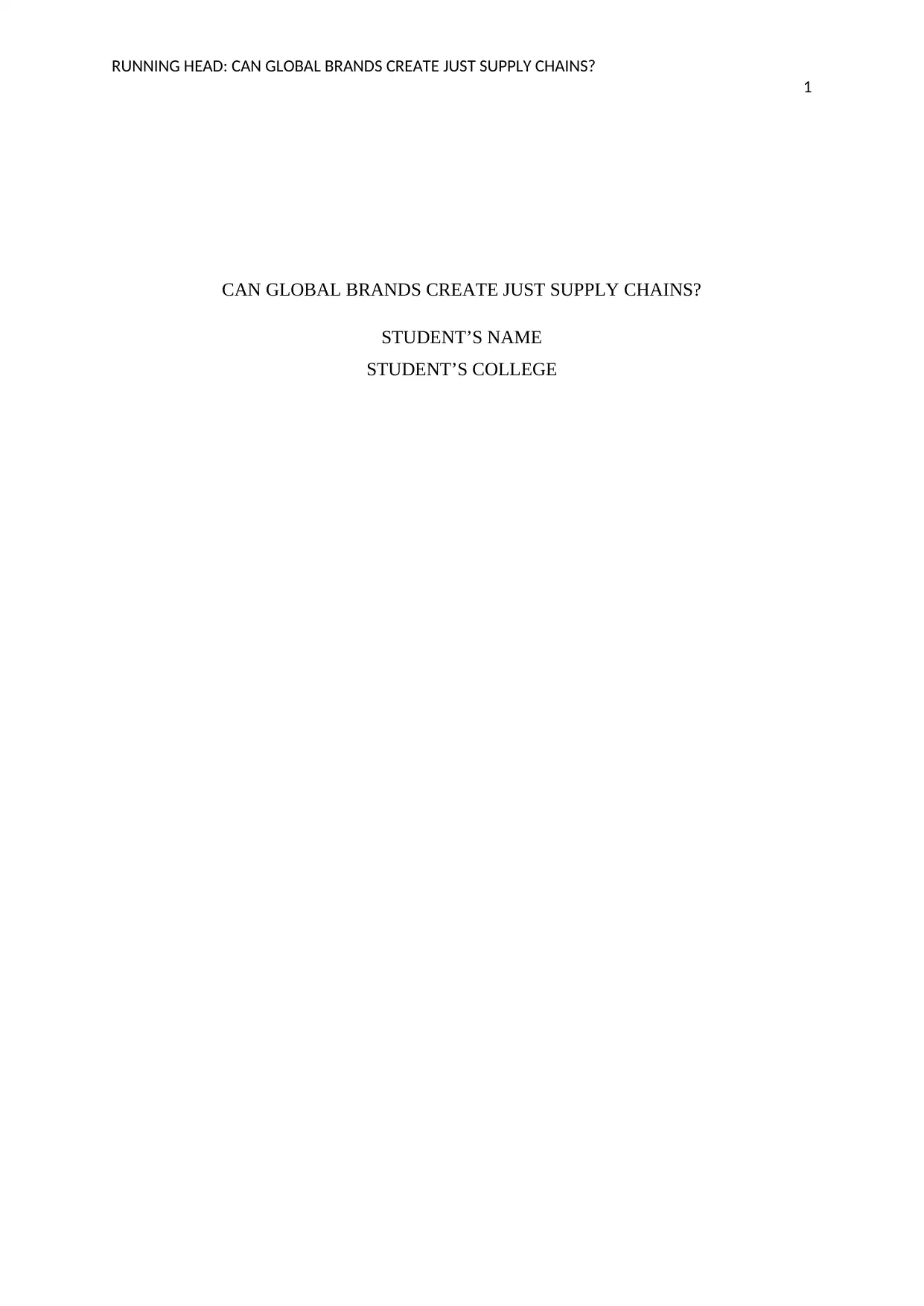
RUNNING HEAD: CAN GLOBAL BRANDS CREATE JUST SUPPLY CHAINS?
1
CAN GLOBAL BRANDS CREATE JUST SUPPLY CHAINS?
STUDENT’S NAME
STUDENT’S COLLEGE
1
CAN GLOBAL BRANDS CREATE JUST SUPPLY CHAINS?
STUDENT’S NAME
STUDENT’S COLLEGE
Paraphrase This Document
Need a fresh take? Get an instant paraphrase of this document with our AI Paraphraser
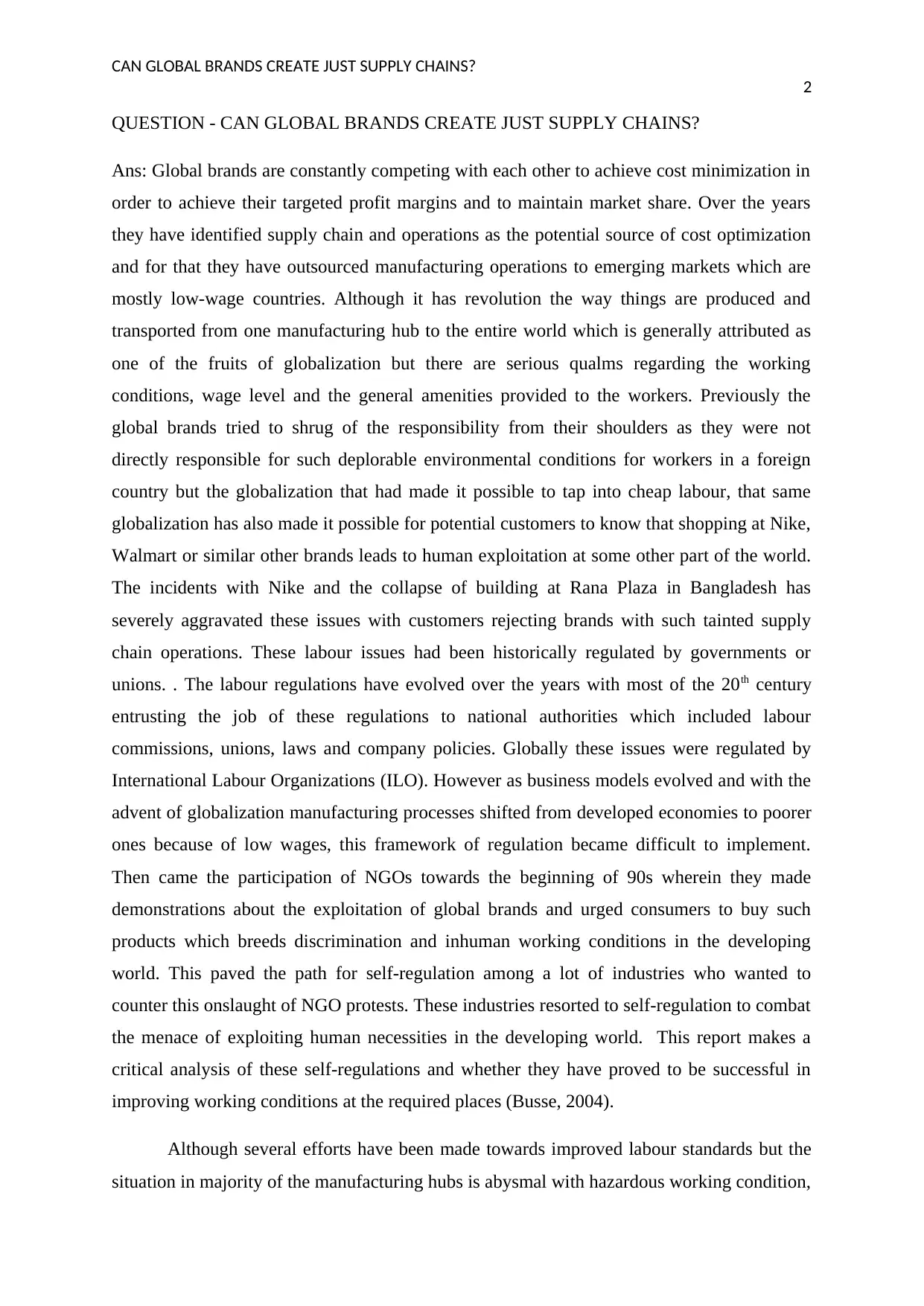
CAN GLOBAL BRANDS CREATE JUST SUPPLY CHAINS?
2
QUESTION - CAN GLOBAL BRANDS CREATE JUST SUPPLY CHAINS?
Ans: Global brands are constantly competing with each other to achieve cost minimization in
order to achieve their targeted profit margins and to maintain market share. Over the years
they have identified supply chain and operations as the potential source of cost optimization
and for that they have outsourced manufacturing operations to emerging markets which are
mostly low-wage countries. Although it has revolution the way things are produced and
transported from one manufacturing hub to the entire world which is generally attributed as
one of the fruits of globalization but there are serious qualms regarding the working
conditions, wage level and the general amenities provided to the workers. Previously the
global brands tried to shrug of the responsibility from their shoulders as they were not
directly responsible for such deplorable environmental conditions for workers in a foreign
country but the globalization that had made it possible to tap into cheap labour, that same
globalization has also made it possible for potential customers to know that shopping at Nike,
Walmart or similar other brands leads to human exploitation at some other part of the world.
The incidents with Nike and the collapse of building at Rana Plaza in Bangladesh has
severely aggravated these issues with customers rejecting brands with such tainted supply
chain operations. These labour issues had been historically regulated by governments or
unions. . The labour regulations have evolved over the years with most of the 20th century
entrusting the job of these regulations to national authorities which included labour
commissions, unions, laws and company policies. Globally these issues were regulated by
International Labour Organizations (ILO). However as business models evolved and with the
advent of globalization manufacturing processes shifted from developed economies to poorer
ones because of low wages, this framework of regulation became difficult to implement.
Then came the participation of NGOs towards the beginning of 90s wherein they made
demonstrations about the exploitation of global brands and urged consumers to buy such
products which breeds discrimination and inhuman working conditions in the developing
world. This paved the path for self-regulation among a lot of industries who wanted to
counter this onslaught of NGO protests. These industries resorted to self-regulation to combat
the menace of exploiting human necessities in the developing world. This report makes a
critical analysis of these self-regulations and whether they have proved to be successful in
improving working conditions at the required places (Busse, 2004).
Although several efforts have been made towards improved labour standards but the
situation in majority of the manufacturing hubs is abysmal with hazardous working condition,
2
QUESTION - CAN GLOBAL BRANDS CREATE JUST SUPPLY CHAINS?
Ans: Global brands are constantly competing with each other to achieve cost minimization in
order to achieve their targeted profit margins and to maintain market share. Over the years
they have identified supply chain and operations as the potential source of cost optimization
and for that they have outsourced manufacturing operations to emerging markets which are
mostly low-wage countries. Although it has revolution the way things are produced and
transported from one manufacturing hub to the entire world which is generally attributed as
one of the fruits of globalization but there are serious qualms regarding the working
conditions, wage level and the general amenities provided to the workers. Previously the
global brands tried to shrug of the responsibility from their shoulders as they were not
directly responsible for such deplorable environmental conditions for workers in a foreign
country but the globalization that had made it possible to tap into cheap labour, that same
globalization has also made it possible for potential customers to know that shopping at Nike,
Walmart or similar other brands leads to human exploitation at some other part of the world.
The incidents with Nike and the collapse of building at Rana Plaza in Bangladesh has
severely aggravated these issues with customers rejecting brands with such tainted supply
chain operations. These labour issues had been historically regulated by governments or
unions. . The labour regulations have evolved over the years with most of the 20th century
entrusting the job of these regulations to national authorities which included labour
commissions, unions, laws and company policies. Globally these issues were regulated by
International Labour Organizations (ILO). However as business models evolved and with the
advent of globalization manufacturing processes shifted from developed economies to poorer
ones because of low wages, this framework of regulation became difficult to implement.
Then came the participation of NGOs towards the beginning of 90s wherein they made
demonstrations about the exploitation of global brands and urged consumers to buy such
products which breeds discrimination and inhuman working conditions in the developing
world. This paved the path for self-regulation among a lot of industries who wanted to
counter this onslaught of NGO protests. These industries resorted to self-regulation to combat
the menace of exploiting human necessities in the developing world. This report makes a
critical analysis of these self-regulations and whether they have proved to be successful in
improving working conditions at the required places (Busse, 2004).
Although several efforts have been made towards improved labour standards but the
situation in majority of the manufacturing hubs is abysmal with hazardous working condition,
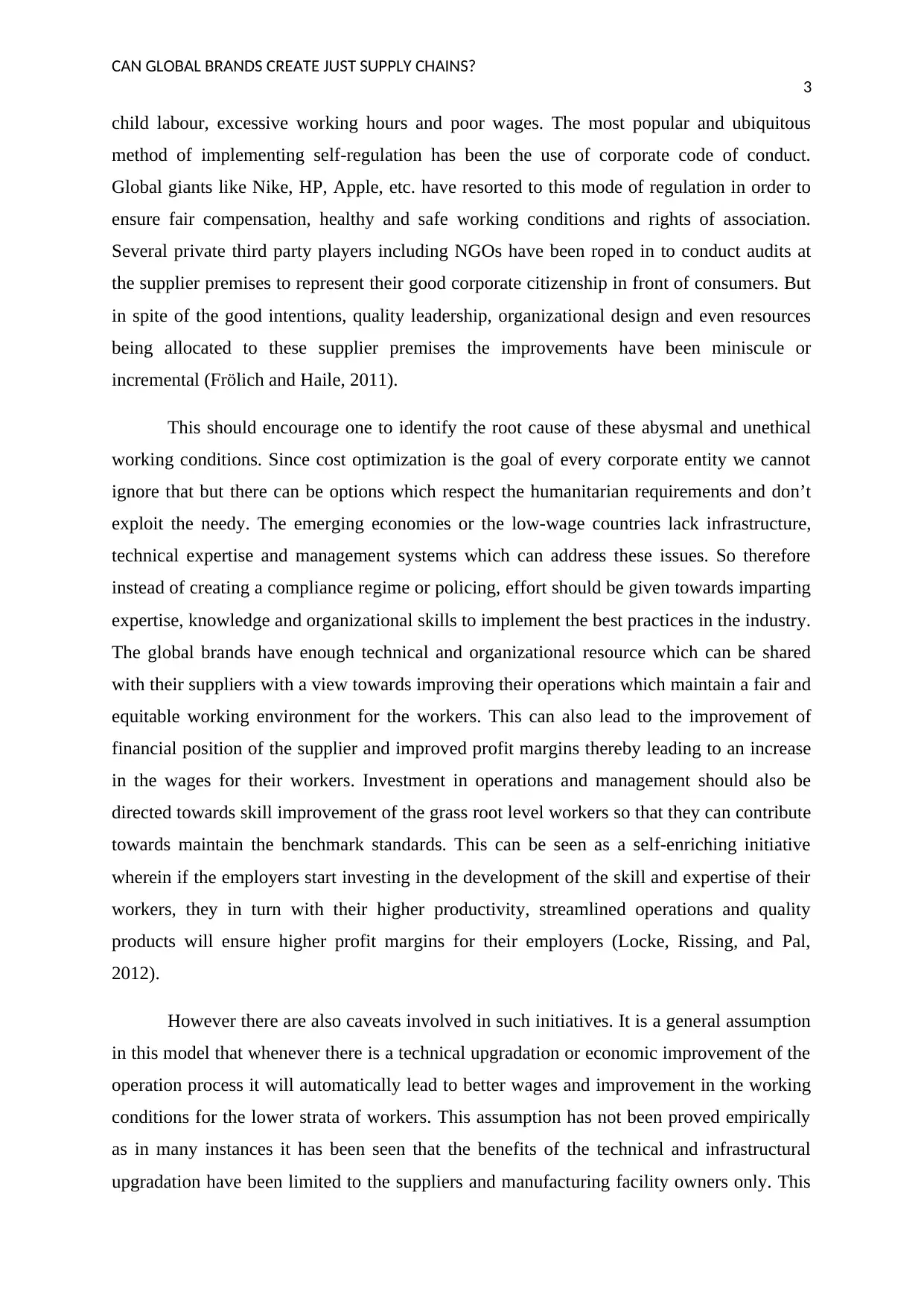
CAN GLOBAL BRANDS CREATE JUST SUPPLY CHAINS?
3
child labour, excessive working hours and poor wages. The most popular and ubiquitous
method of implementing self-regulation has been the use of corporate code of conduct.
Global giants like Nike, HP, Apple, etc. have resorted to this mode of regulation in order to
ensure fair compensation, healthy and safe working conditions and rights of association.
Several private third party players including NGOs have been roped in to conduct audits at
the supplier premises to represent their good corporate citizenship in front of consumers. But
in spite of the good intentions, quality leadership, organizational design and even resources
being allocated to these supplier premises the improvements have been miniscule or
incremental (Frölich and Haile, 2011).
This should encourage one to identify the root cause of these abysmal and unethical
working conditions. Since cost optimization is the goal of every corporate entity we cannot
ignore that but there can be options which respect the humanitarian requirements and don’t
exploit the needy. The emerging economies or the low-wage countries lack infrastructure,
technical expertise and management systems which can address these issues. So therefore
instead of creating a compliance regime or policing, effort should be given towards imparting
expertise, knowledge and organizational skills to implement the best practices in the industry.
The global brands have enough technical and organizational resource which can be shared
with their suppliers with a view towards improving their operations which maintain a fair and
equitable working environment for the workers. This can also lead to the improvement of
financial position of the supplier and improved profit margins thereby leading to an increase
in the wages for their workers. Investment in operations and management should also be
directed towards skill improvement of the grass root level workers so that they can contribute
towards maintain the benchmark standards. This can be seen as a self-enriching initiative
wherein if the employers start investing in the development of the skill and expertise of their
workers, they in turn with their higher productivity, streamlined operations and quality
products will ensure higher profit margins for their employers (Locke, Rissing, and Pal,
2012).
However there are also caveats involved in such initiatives. It is a general assumption
in this model that whenever there is a technical upgradation or economic improvement of the
operation process it will automatically lead to better wages and improvement in the working
conditions for the lower strata of workers. This assumption has not been proved empirically
as in many instances it has been seen that the benefits of the technical and infrastructural
upgradation have been limited to the suppliers and manufacturing facility owners only. This
3
child labour, excessive working hours and poor wages. The most popular and ubiquitous
method of implementing self-regulation has been the use of corporate code of conduct.
Global giants like Nike, HP, Apple, etc. have resorted to this mode of regulation in order to
ensure fair compensation, healthy and safe working conditions and rights of association.
Several private third party players including NGOs have been roped in to conduct audits at
the supplier premises to represent their good corporate citizenship in front of consumers. But
in spite of the good intentions, quality leadership, organizational design and even resources
being allocated to these supplier premises the improvements have been miniscule or
incremental (Frölich and Haile, 2011).
This should encourage one to identify the root cause of these abysmal and unethical
working conditions. Since cost optimization is the goal of every corporate entity we cannot
ignore that but there can be options which respect the humanitarian requirements and don’t
exploit the needy. The emerging economies or the low-wage countries lack infrastructure,
technical expertise and management systems which can address these issues. So therefore
instead of creating a compliance regime or policing, effort should be given towards imparting
expertise, knowledge and organizational skills to implement the best practices in the industry.
The global brands have enough technical and organizational resource which can be shared
with their suppliers with a view towards improving their operations which maintain a fair and
equitable working environment for the workers. This can also lead to the improvement of
financial position of the supplier and improved profit margins thereby leading to an increase
in the wages for their workers. Investment in operations and management should also be
directed towards skill improvement of the grass root level workers so that they can contribute
towards maintain the benchmark standards. This can be seen as a self-enriching initiative
wherein if the employers start investing in the development of the skill and expertise of their
workers, they in turn with their higher productivity, streamlined operations and quality
products will ensure higher profit margins for their employers (Locke, Rissing, and Pal,
2012).
However there are also caveats involved in such initiatives. It is a general assumption
in this model that whenever there is a technical upgradation or economic improvement of the
operation process it will automatically lead to better wages and improvement in the working
conditions for the lower strata of workers. This assumption has not been proved empirically
as in many instances it has been seen that the benefits of the technical and infrastructural
upgradation have been limited to the suppliers and manufacturing facility owners only. This
⊘ This is a preview!⊘
Do you want full access?
Subscribe today to unlock all pages.

Trusted by 1+ million students worldwide
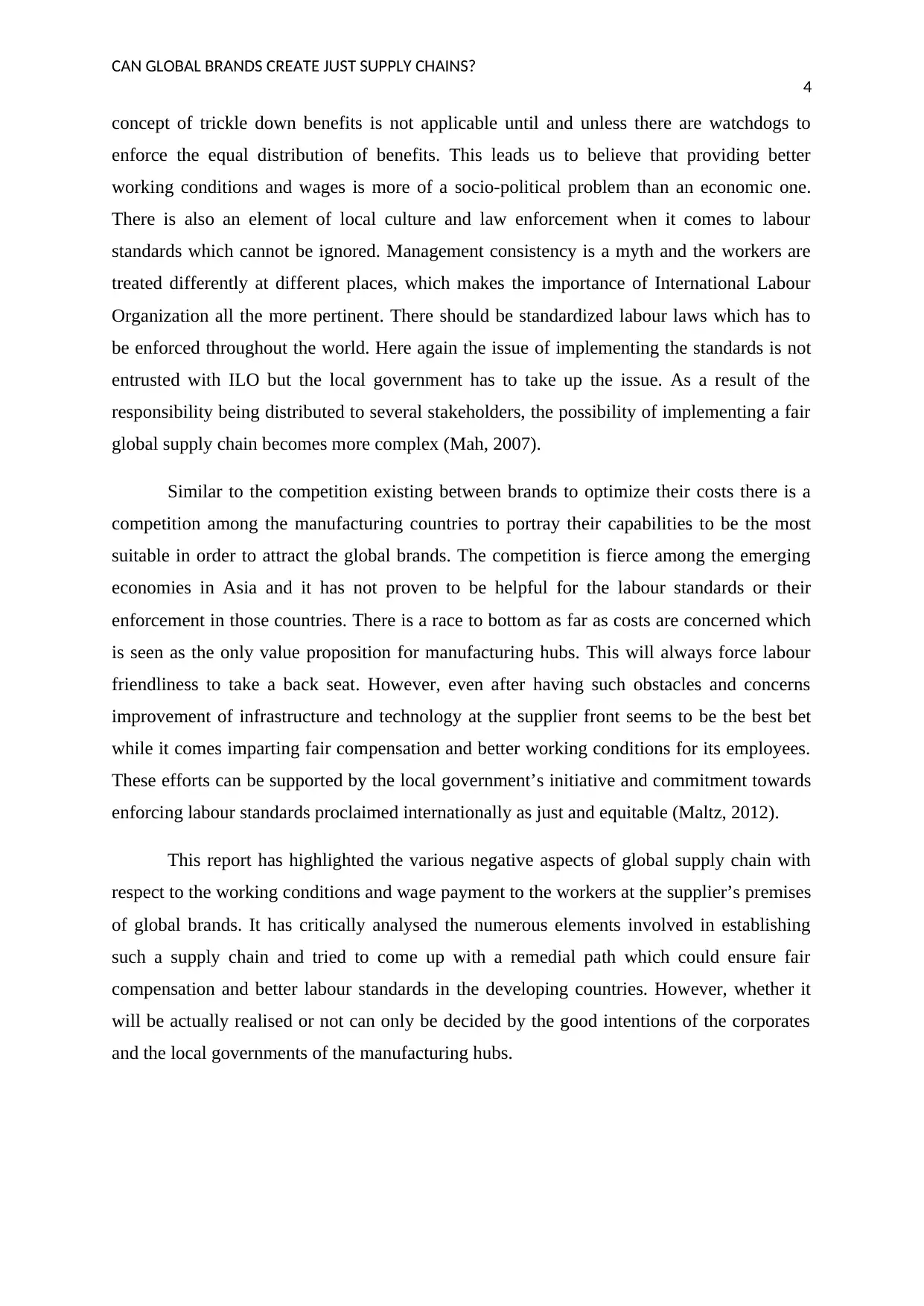
CAN GLOBAL BRANDS CREATE JUST SUPPLY CHAINS?
4
concept of trickle down benefits is not applicable until and unless there are watchdogs to
enforce the equal distribution of benefits. This leads us to believe that providing better
working conditions and wages is more of a socio-political problem than an economic one.
There is also an element of local culture and law enforcement when it comes to labour
standards which cannot be ignored. Management consistency is a myth and the workers are
treated differently at different places, which makes the importance of International Labour
Organization all the more pertinent. There should be standardized labour laws which has to
be enforced throughout the world. Here again the issue of implementing the standards is not
entrusted with ILO but the local government has to take up the issue. As a result of the
responsibility being distributed to several stakeholders, the possibility of implementing a fair
global supply chain becomes more complex (Mah, 2007).
Similar to the competition existing between brands to optimize their costs there is a
competition among the manufacturing countries to portray their capabilities to be the most
suitable in order to attract the global brands. The competition is fierce among the emerging
economies in Asia and it has not proven to be helpful for the labour standards or their
enforcement in those countries. There is a race to bottom as far as costs are concerned which
is seen as the only value proposition for manufacturing hubs. This will always force labour
friendliness to take a back seat. However, even after having such obstacles and concerns
improvement of infrastructure and technology at the supplier front seems to be the best bet
while it comes imparting fair compensation and better working conditions for its employees.
These efforts can be supported by the local government’s initiative and commitment towards
enforcing labour standards proclaimed internationally as just and equitable (Maltz, 2012).
This report has highlighted the various negative aspects of global supply chain with
respect to the working conditions and wage payment to the workers at the supplier’s premises
of global brands. It has critically analysed the numerous elements involved in establishing
such a supply chain and tried to come up with a remedial path which could ensure fair
compensation and better labour standards in the developing countries. However, whether it
will be actually realised or not can only be decided by the good intentions of the corporates
and the local governments of the manufacturing hubs.
4
concept of trickle down benefits is not applicable until and unless there are watchdogs to
enforce the equal distribution of benefits. This leads us to believe that providing better
working conditions and wages is more of a socio-political problem than an economic one.
There is also an element of local culture and law enforcement when it comes to labour
standards which cannot be ignored. Management consistency is a myth and the workers are
treated differently at different places, which makes the importance of International Labour
Organization all the more pertinent. There should be standardized labour laws which has to
be enforced throughout the world. Here again the issue of implementing the standards is not
entrusted with ILO but the local government has to take up the issue. As a result of the
responsibility being distributed to several stakeholders, the possibility of implementing a fair
global supply chain becomes more complex (Mah, 2007).
Similar to the competition existing between brands to optimize their costs there is a
competition among the manufacturing countries to portray their capabilities to be the most
suitable in order to attract the global brands. The competition is fierce among the emerging
economies in Asia and it has not proven to be helpful for the labour standards or their
enforcement in those countries. There is a race to bottom as far as costs are concerned which
is seen as the only value proposition for manufacturing hubs. This will always force labour
friendliness to take a back seat. However, even after having such obstacles and concerns
improvement of infrastructure and technology at the supplier front seems to be the best bet
while it comes imparting fair compensation and better working conditions for its employees.
These efforts can be supported by the local government’s initiative and commitment towards
enforcing labour standards proclaimed internationally as just and equitable (Maltz, 2012).
This report has highlighted the various negative aspects of global supply chain with
respect to the working conditions and wage payment to the workers at the supplier’s premises
of global brands. It has critically analysed the numerous elements involved in establishing
such a supply chain and tried to come up with a remedial path which could ensure fair
compensation and better labour standards in the developing countries. However, whether it
will be actually realised or not can only be decided by the good intentions of the corporates
and the local governments of the manufacturing hubs.
Paraphrase This Document
Need a fresh take? Get an instant paraphrase of this document with our AI Paraphraser
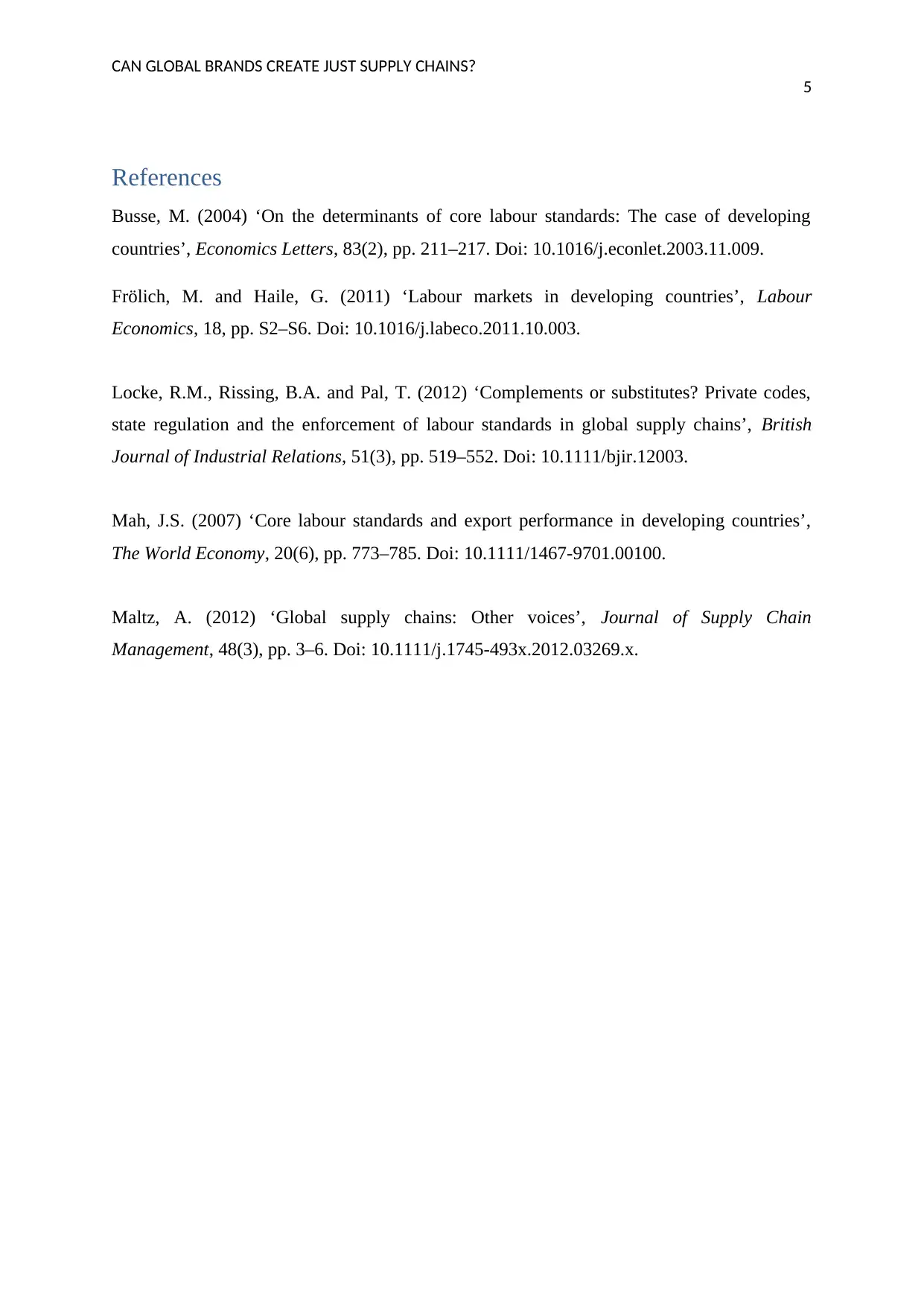
CAN GLOBAL BRANDS CREATE JUST SUPPLY CHAINS?
5
References
Busse, M. (2004) ‘On the determinants of core labour standards: The case of developing
countries’, Economics Letters, 83(2), pp. 211–217. Doi: 10.1016/j.econlet.2003.11.009.
Frölich, M. and Haile, G. (2011) ‘Labour markets in developing countries’, Labour
Economics, 18, pp. S2–S6. Doi: 10.1016/j.labeco.2011.10.003.
Locke, R.M., Rissing, B.A. and Pal, T. (2012) ‘Complements or substitutes? Private codes,
state regulation and the enforcement of labour standards in global supply chains’, British
Journal of Industrial Relations, 51(3), pp. 519–552. Doi: 10.1111/bjir.12003.
Mah, J.S. (2007) ‘Core labour standards and export performance in developing countries’,
The World Economy, 20(6), pp. 773–785. Doi: 10.1111/1467-9701.00100.
Maltz, A. (2012) ‘Global supply chains: Other voices’, Journal of Supply Chain
Management, 48(3), pp. 3–6. Doi: 10.1111/j.1745-493x.2012.03269.x.
5
References
Busse, M. (2004) ‘On the determinants of core labour standards: The case of developing
countries’, Economics Letters, 83(2), pp. 211–217. Doi: 10.1016/j.econlet.2003.11.009.
Frölich, M. and Haile, G. (2011) ‘Labour markets in developing countries’, Labour
Economics, 18, pp. S2–S6. Doi: 10.1016/j.labeco.2011.10.003.
Locke, R.M., Rissing, B.A. and Pal, T. (2012) ‘Complements or substitutes? Private codes,
state regulation and the enforcement of labour standards in global supply chains’, British
Journal of Industrial Relations, 51(3), pp. 519–552. Doi: 10.1111/bjir.12003.
Mah, J.S. (2007) ‘Core labour standards and export performance in developing countries’,
The World Economy, 20(6), pp. 773–785. Doi: 10.1111/1467-9701.00100.
Maltz, A. (2012) ‘Global supply chains: Other voices’, Journal of Supply Chain
Management, 48(3), pp. 3–6. Doi: 10.1111/j.1745-493x.2012.03269.x.
1 out of 5
Related Documents
Your All-in-One AI-Powered Toolkit for Academic Success.
+13062052269
info@desklib.com
Available 24*7 on WhatsApp / Email
![[object Object]](/_next/static/media/star-bottom.7253800d.svg)
Unlock your academic potential
Copyright © 2020–2025 A2Z Services. All Rights Reserved. Developed and managed by ZUCOL.





